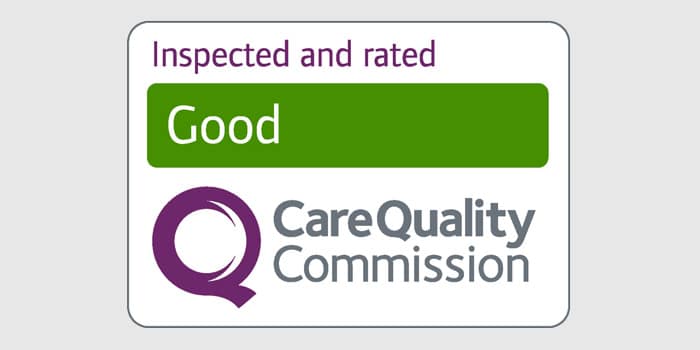Respite Care
Find quality Respite Care in the comfort of your home.

What is Respite Care?
Respite Care is a form of support where a professional Carer covers for a regular caregiver, often a relative, friend or neighbour.
Everybody needs a break at some point but for many regular caregivers, finding time can sometimes feel impossible. Respite Care is designed to help in these situations. It enables caregivers to enjoy a holiday or a regular break away from their responsibilities or provides cover in the event of an emergency.
Some of the most common reasons people need Respite Care are:
Our Care Workers are trained to maintain continuity of care while minimising stress and uncertainty wherever possible. This can reduce anxiety and other negatives (such as complications from variations to nutrition or medication) arising from changes in routines. We work with you to ensure a smooth and safe transition as we take on Respite Care.
Your home. Your care. Your choice.


Why choose Respite Care?
At Alina Homecare, we understand that regular caregivers can only provide the very best care to their loved ones by also taking good care of themselves.
It’s essential to have some ‘me time’, with a chance to rest and relax away from the home. Our Respite Care for caregivers makes this possible with reliable, compassionate care personalised to your specific needs. You’ll have added peace of mind from knowing your loved one is being looked after by a professional, giving you the chance to spend time elsewhere.
Our Care Workers come prepared to slot into your normal routine. They’re there to reassure you and work with you to provide the support you need, when you need it.
In the event of an emergency, Respite Care can involve a short term regular arrangement while you recover and readjust to daily life. Some people opt for a Live-in Carer when recovering from illness or an operation to give them peace of mind that support is nearby 24 hours a day.
Why choose Alina Homecare?
What is included in Respite Care?
Our Respite Care service is for regular support in the home delivered by Carers exclusively trained by our Academy. Whether you need continuation of your normal care such as Personal Care, more specialist care such as our Dementia Care, or simply want some Companion Care while your primary caregiver has a regular break, we can help.
We also provide a wide range of other Home Care services including:
What to expect from Respite Care at Home
Our Respite Care at Home service is provided by a fully trained Professional Team. They’ll help your loved one with their needs to support them to live as independently as possible.
From preparing balanced meals to light household tasks, or even just being a friendly face to pop in for a chat. At Alina Homecare, we make life easier.



What are the benefits of Respite Care at Home?
There are many benefits to Respite Care for both the caregiver and the person receiving care. These include:
Deciding to receive Respite Care
Though it may feel clear that a regular caregiver needs a break from the various demands of caregiving, many people can struggle to seek help. We understand how challenging it can be to hand over the responsibility of a loved one’s care to a stranger. Our Care Team meet with you in advance and are trained to provide reassurance and confidence to support the transition.
Planning and choice are vital parts of receiving Respite Care. Our Team will assess your needs to understand your requirements and your care plan will be tailored specifically to your individual circumstances. Some of the most common reasons our clients and their loved ones choose our Respite Care include:
Respite Care reviews
We’re proud to provide support for our clients across the South of England. Find out how our Respite Care at Home services have benefitted them with these independent reviews on homecare.co.uk:
Fully managed support
About our Team
Our Team of friendly Respite Care Workers have received training through our exclusive Alina Homecare Academy and are ready to help. From laundry to cooking, or even just popping in for a chat, we can help.
At Alina Homecare, we’re regulated by the Care Quality Commission (CQC) and proud winners of the homecare.co.uk Top 20 UK Home Care Group Award 2021, 2022, 2023, 2024 & 2025. We are extremely proud of the standard of care we deliver and we’re passionate about making what we call the ‘Alina Difference’ to peoples lives.
It’s no wonder why 99.7% of clients say they’re satisfied with our care and support!
Cost of Respite Care
The cost of Respite Care at Home varies according to your needs. Our Team works with you to find a personalised care plan that suits your requirements, routine and budget.
Complete our cost calculator to learn more about the cost of Respite Care.
When you get in touch, we can arrange a no obligation free home visit to discuss your needs in more detail.

Quick questions
What is Respite Care?
Respite Care is a form of support where a professional Carer covers for a regular caregiver. There are many types of Respite Care available, both inside and outside the home. At Alina Homecare, our Respite Care service is mainly for primary caregivers to take regular breaks away from their responsibilities. We maintain continuity of care and ensure the person receiving care has their needs met while their regular caregiver is away. Find your local Alina Homecare Team to learn more about how we can help you.
What is included with Respite Care?
Respite Care can include any aspect of our Home Care services. It’s also available as Live-in Care, where a Carer moves into your or your loved one’s home to provide 24 hour care. Our Care Workers can help with all manner of daily tasks, such as using the bathroom, making a meal or going out on a day trip.
How can Respite Care help me?
Having a professionally trained Care Worker support your loved one ensures that regular caregivers can have much needed time for themselves. The prospect of caregiver burnout is a very real risk for many and Respite Care is a great way of ensuring your own wellbeing and the best quality care is available for your loved one.
What does a Respite Care home visit involve?
If you are considering Respite Care, we recommend arranging a free home visit from our local Team to discuss your loved ones care needs. The reason for an initial home visit is to ensure a care plan is tailored specifically to you and your loved one’s needs and preferences. We take time to get to know you both, understanding likes and dislikes so we can provide care that’s tailored.
Arranging care for the first time, or taking a break as a regular caregiver, can be stressful and daunting. There are often a lot of questions that need answering and our local Teams are ready to chat when you need them. To get started, find your local Team.
What are the different types of Respite Care?
There are many different types of Respite Care available and not all forms involve remaining in your own home. The type of care you and your loved ones choose should ultimately depend on your specific needs. At Alina Homecare, we specialise in providing Respite Care in your own home to ensure continuity and independence are always maintained. Types of Respite Care can include:
Respite day centres – provide individuals with activities, social interactions, meals and much more. It’s always a good idea to visit the day centre before the respite period begins. This is a good way of ensuring staff know the person needing care. It can also help reassure the primary caregiver that the day centre is the right environment for their loved one. Some respite day care centres provide accommodation and additional services, including respite day centres specifically for younger individuals or particular healthcare needs. For instance, there are many dementia day care centres across the country.
Residential respite care homes – care homes are another option to consider for Respite Care. There are many different options for care homes, many with specific expertise like nursing homes and dementia care homes. Many of these homes offer Respite Care services in residential settings, where the person receiving care can meet and engage with others during their stay. However, getting respite space at short notice can be difficult. Some care homes do accept advance bookings to help you plan ahead such as if you want to book a holiday.
Respite Care at Home – not everybody enjoys, wants or has the opportunity to leave home to receive Respite Care. Home Care and Respite Live-in Care are viable options for many people. Both services allow you or your loved one to continue receiving quality care with minimum disruption or change. If the regular caregiver also lives with the person receiving care, Live-in Care can be particularly reassuring as it means a care professional is available at all times of the day.
Other Options – some people choose to move in and live with someone else for a short time to provide Respite Care. There are schemes available that support this such as Shared Lives Plus. This scheme enables individuals in need of one or two weeks of Respite Care to live with other individuals they get along with or with Carers who have opened up their homes for them. For more information, visit Shared Lives Plus for services they could offer in your area.
How can I fund Respite Care?
There are many different ways to fund care. Find out more by reading our guide to Home Care funding.
How much does it cost?
Respite Care costs vary according to the type of care needed, the number of care visits and where you live. To learn more and to get a free no obligation personalised quote, find your local Team.
Who pays for Respite Care?
Funding Respite Care will vary from person to person. As with other care and support, it will be means tested if funded by the council or a charity. Alternatively, it can be self funded. For a local council to agree to pay for Respite Care for either yourself as a caregiver or the person you look after, you must both have an assessment. This can be done on the government’s website. Alternatively, you and your loved ones can fund Respite Care and arrange it directly with a care provider like Alina Homecare. Once you contact us, we will assess your needs and provide a care plan and cost. Find your local Alina Homecare Team to get started.
Will a Respite Care break affect my benefits?
If you are a regular caregiver and take time off from caring for respite, there are rules to determine whether you will receive Carer’s Allowance. Generally, the rule is that you can continue to receive Carer’s Allowance for up to four weeks if you have a break from caring in a six month period. It’s always best to check with social services before arranging Respite Care.
How does Alina Homecare compare to an introductory agency?
Agencies are not regulated and quality cannot be guaranteed. We provide fully regulated services that are inspected by the Care Quality Commission (CQC). We also provide full and exclusive training for our Care Workers, whereas private and agency staff may not have comprehensive training. In addition to this, our services are also backed up with central support; this means you can count on us even if your Care Worker needs time off, as our local Team can step in to ensure continuity of care.
How does Alina Homecare compare to an agency?
Agencies are not regulated and quality cannot be guaranteed. We provide fully regulated services that are inspected by the CQC. We also provide full and exclusive training for our Care Workers, whereas private and agency Carers may not have comprehensive training. In addition to this, our services are also backed up with central support; this means you can count on us even if your Care Worker needs time off as our local Team can step in to ensure continuity of care.
What areas do you cover?
We provide Respite Home Care across the South of England. Find your local Team.
How is Respite Care monitored?
Like all our services, our Respite Care is regulated by the CQC. This is an independent regulator that inspects our services to ensure our quality standards are maintained. This includes checking that our care is focused on our clients as individuals, as well as that we keep you safe and secure at all times. In addition to this, we are proud to partner with Birdie. Birdie’s innovative care technology enables us to digitally log and monitor the support we provide. The Birdie Family app., with your consent, also allows full visibility of care at any time for you and your loved ones. It’s a great way of providing added reassurance that you’re receiving the highest quality care.








